30th Anniversary Celebration Interview and Sale: Part Two
Mike Allen / Friday, September 23rd, 2022 / No Comments »Six dark fantasy and horror titles
discounted to 99¢
for an early Halloween start
See a map of how my stories and upcoming novel connect
Read the beginning of my 30th anniversary interview
How do you feel about the way your poetry was distributed versus your prose?
Humans plan, gods chuckle. In this particular channel, the way this principle applied had to do with how I imagined my career would go vs. how it really went down. I had an early burst of short story sales, but my writing skills didn’t yet match my ambition, and further sales of stories came few and far between.
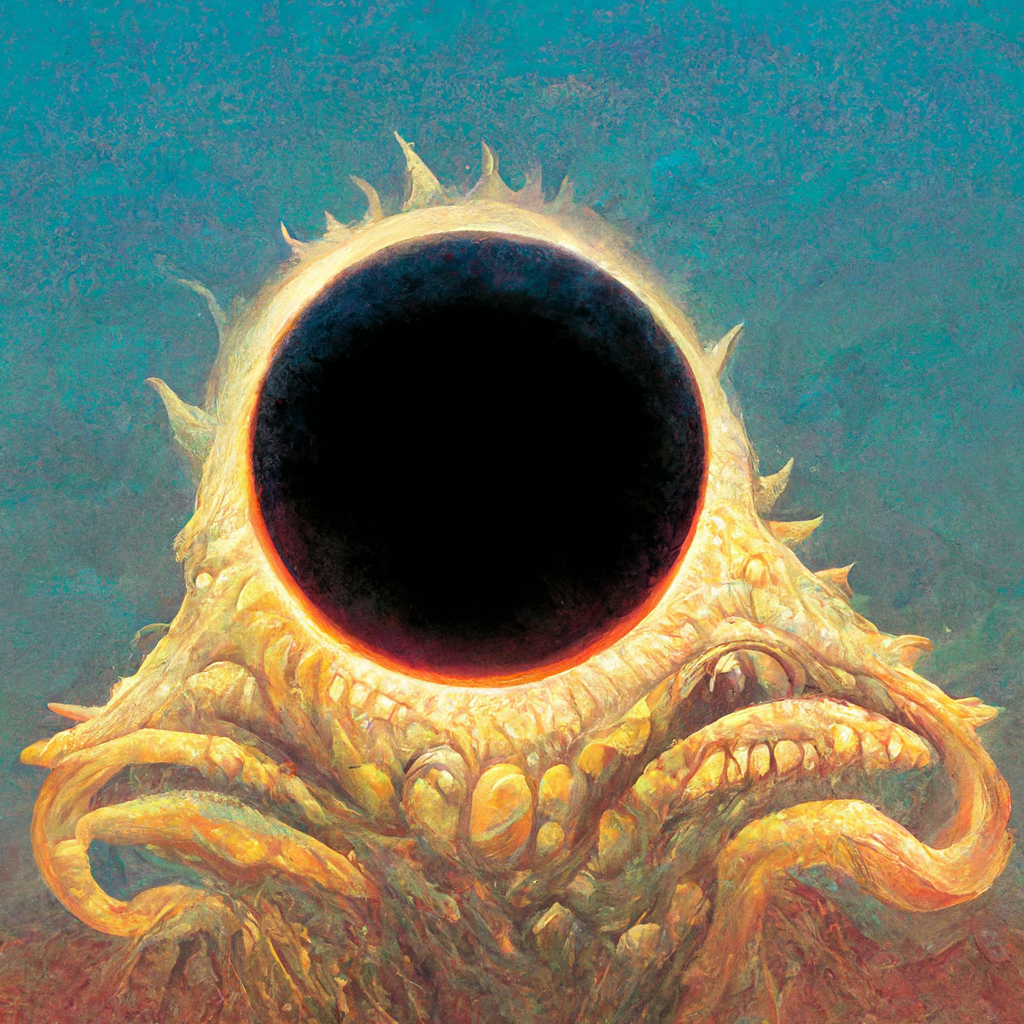
Inspired by “Father,” the monster from “Let There Be Darkness”
However, the poems I was writing at the same time started to find homes with greater and greater frequency, and that encouraged me to crank out even more poems. Ten years on, only a handful of my stories had seen print, but I’d had dozens of poems published, including years of repeated contributions to the respected small press journal Tales of the Unanticipated. Quite a few of those TOTU pieces were intensely experimental. I loved the freedom poetry gave me in that regard.
2002 saw my earliest appearances in Strange Horizons. That’s also the year a quirky online outlet called EOTU Ezine published “Epochs in Exile: A Fantasy Trilogy,” a genre-blurring piece about aliens and dragons that I co-wrote with fellow Roanoke author Charles M. Saplak. The next year “Epochs” ended up winning my first Rhysling Award — tied for first place in the Science Fiction Poetry Association voting, in fact, with “Matlacihuatl’s Gift” by my longtime friend and colleague Sonya Taaffe.
Not to mention, my poetry-only DIY zine Mythic Delirium had after a mere two issues been added to the DNA Publications stable of magazines, which meant it was suddenly a sister publication to the likes of Aboriginal SF, Absolute Magnitude and Weird Tales. Mythic Delirium did not get national newsstand distribution — boy, would that have been impractical — but large ads for it appeared in magazines that did!
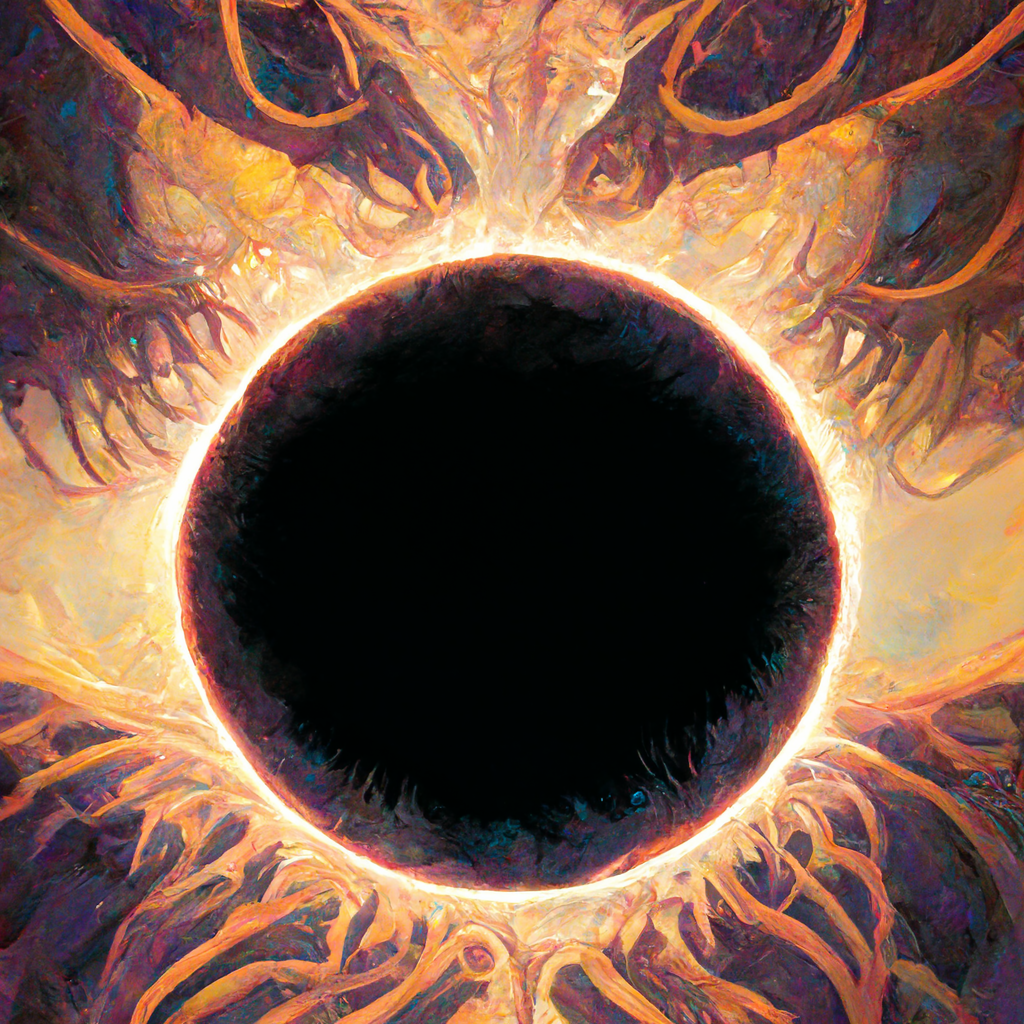
Inspired by “Father,” the monster from “Let There Be Darkness”
I noticed people in the speculative fiction field referring to me as a poet, and even discussing my work on occasion. It was never my intention to only be a poet, but I think it was only natural that I leaned into what was working.
Growing up in Appalachia, making those solo reading explorations absent any interaction with sf fandom, I got the impression that poetry and fiction walked hand in hand in the speculative field. Reading essays about J.R.R. Tolkien led me to T.S. Eliot’s “The Waste Land” — not to mention, Tolkien himself published a poetry collection. Poetry appeared (and still appears!) regularly in Asimov’s Science Fiction, to which I subscribed as a teen.
It wasn’t until I started interacting with a much broader swath of the genre community that I met fans, authors and even editors who reacted to discussions of “science fiction poetry” the way those comically wrong characters in the Reese’s Cup commercials exclaim in horror at the thought of blending peanut butter and chocolate. Really, it was one rude awakening among many — the belief I had that people who enjoyed such inspirational, aspirational literature would embody those qualities themselves, that bubble got popped over and over again; I mean, many definitely do, but hardly all. More specifically, much closer to the heart and art, I often found myself having to defend my choice to write the kind of poetry I did after years of just presuming most all genre authors wrote the stuff. This played a large hand in my volunteer work for the Science Fiction Poetry Association; there’s an upcoming question about that, so I’ll save further elaboration for then.
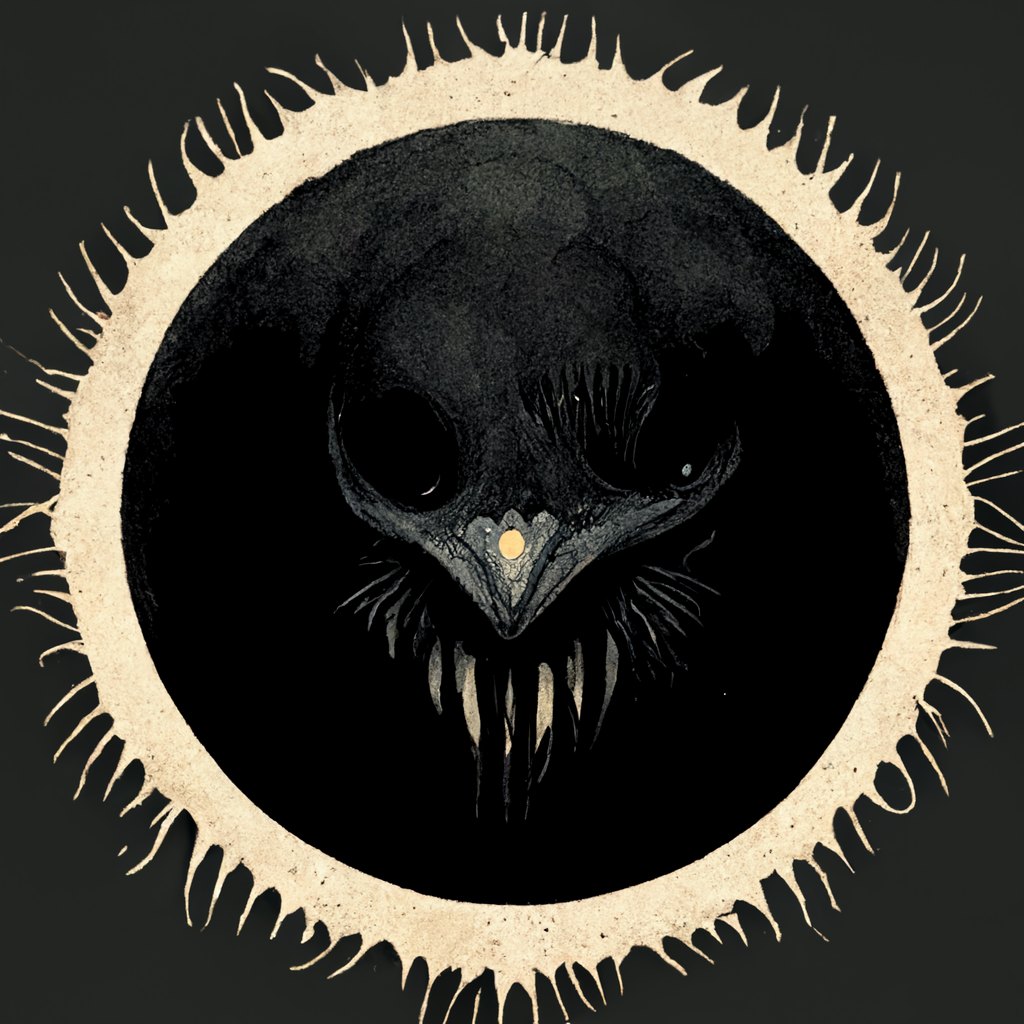
Inspired by “Father,” the monster from “Let There Be Darkness”
Let me skip ahead and say that I think nowadays the field is even more filled with writers who tackle novel series and 14-line poems with the same enthusiasm and editors who appreciate writing as a creative expression that takes many equally valid forms.
I never stopped trying my hand at fiction, and I think one of the interesting ironies involved in accomplishing something with poetry that approximated “success” is that I had to accept I was pouring my best creative energy into a show that would always have a small audience. I didn’t stop writing, editing and publishing poetry, but I pushed harder at fiction editing and fiction writing.
Nothing came easily. I wouldn’t say anything happened along the lines of a breakthrough — but more of my stories found homes, and one of them, my 2007 horror tale “The Button Bin,” made the Nebula Award shortlist. Honestly, being a Nebula finalist didn’t throw any doors wide open for me, but I got first hand experience at playing to a much larger audience, and that at least encouraged me to keep going.
By 2012 a number of events professional and personal had conspired to dull my interest in both the genre poetry scene and the writing of poetry. I wrote a poem called “Hungry Constellations” that I intended essentially as my swan song to that phase of my writing life; it was kind of every theme I had ever tackled, wrapped up into one. That became the title poem of my final large-scale poetry collection, so far the only one that you can buy in an e-edition (and part of the 30th Anniversary Sale!). Dominik Parisien edited Hungry Constellations and did a great job assembling an overview of the wild stuff I got up to as a poet.
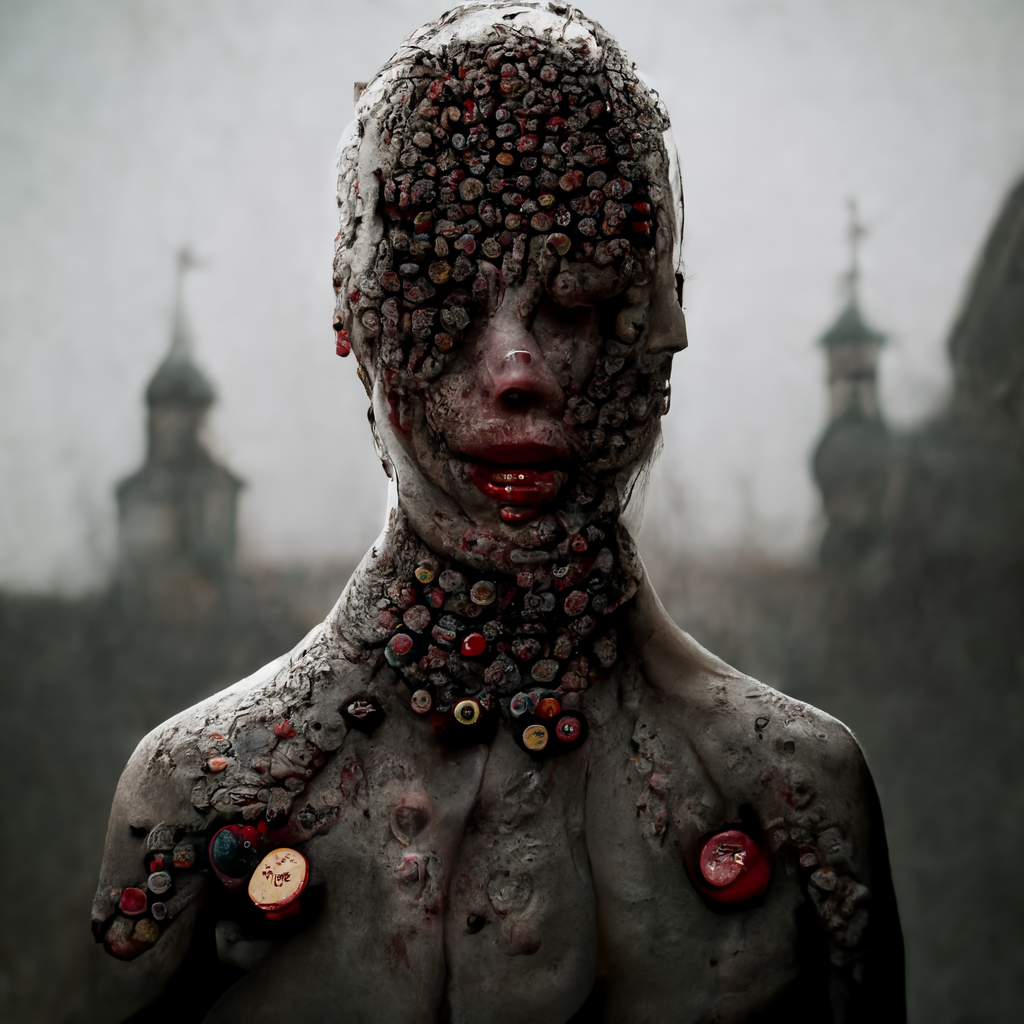
Inspired by the “button people” from “The Button Bin” and “The Quiltmaker”
A couple years after that, the relative obscurity of my short fiction paid off on a scale I never would or could have believed, as a new slew of readers “discovered” me even though I’d been around for nearly a quarter century.
Right book, right cover, right endorsements, right timing: my debut horror collection Unseaming (which kicks off with “The Button Bin”) sold thousands of copies, landed on the Shirley Jackson Award shortlist and strongly hinted to me what the way forward should be.
(I suppose it’s worth noting here that since 1998 I’ve been employed as a newspaper journalist. I keep high walls of church and state separation between my side hustles and my day job. Because of that, folks who hear me talk about my years writing poetry and fiction wouldn’t necessarily know that my career as a journalist has all along been happening simultaneously; I’ve written thousands of news stories, feature stories, columns and editorials. Every once in a while the streams cross, but for the most part I make sure the twain don’t meet.)
Nowadays, thirty years on, the poles have reversed. Most of my creative work that makes it into print is short fiction, with poems few and rare.
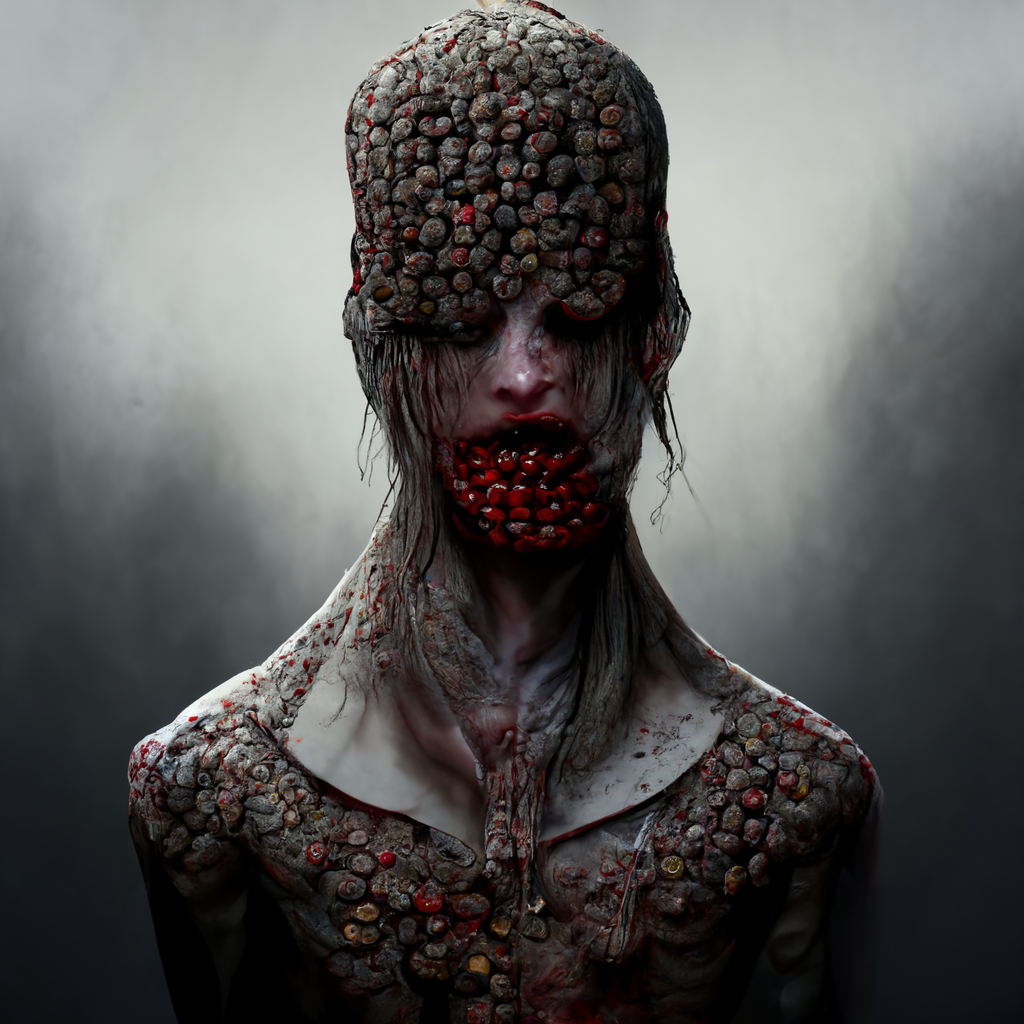
Inspired by the “button people” from “The Button Bin” and “The Quiltmaker”
Yet poetry hasn’t left the building. My most recent collection, Aftermath of an Industrial Accident (which I think of as the follow-up to Unseaming) mixed a few poems in with the stories. Aftermath kind of got obscured by the COVID-19 pandemic, so I feel like a lot of people aren’t aware of its existence — but it also landed on the 2020 Shirley Jackson Award shortlist, which completely bowled me over. It also made the Locus Magazine Recommended Reading List, a first for me as a writer after all this time.
While Sonya Taaffe was poetry editor at The Deadlands, she reached out to me to see if I could come up with something, and for a brief time I found that headspace that I was working in back in the mid-to-late ’00s, when I wrote poems like “Picasso’s Rapture,” “The Strip Search,” “The Journey to Kailash” and “Machine Guns Loaded with Pomegranate Seeds.” The result was “Astynome, After.” So my poetry bug, though mostly dormant, still lives.
At Readercon about four years ago, multiple Hugo nominee Yoon Ha Lee caught me in the hall and told me that my Weird sci-fi poem “Metarebellion” from back in 2002 had a huge impact on him when he read it. Needless to say, that disclosure meant quite a lot to me!
